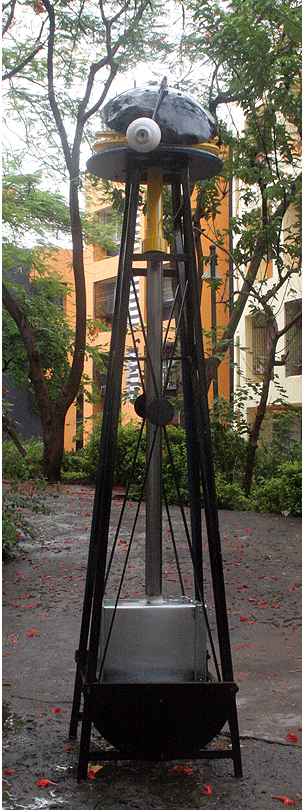- Prelude
- Guest Editor’s Column
- Hard Talk
- Digital Art
- The Write Stuff
- The Art of the Shakers : Shaker Furniture
- New Media
- In the News
- GenNext
- Report
- Artist Index and Statistics
- Market Insight
- Auction Reports
- The month that was
- Mumbai Artsighting
- Musings from Chennai
- Delhi Dias
- Deccan Odyssey
- Art Bengaluru
- In between – from Vadodara
- North-East Opsis
- A Tryst with Art in Madhya Pradesh
- Strands of Social Semiotics
- Transcending Popular
- Art of the Land & Land in Art (part I)
- Through The Patina
- Earth
- Go See India
- Dali's Elephant
- Malleable Memory
- Creative Impulse
- Different hues of Aakriti
- Bonhams : Fine Writing Instruments New York
ART news & views
New Media
Volume: 2 Issue No: 7 Month: 8 Year: 2010
Kausik Mukhopadhyay's Trojan Horse
 “Wikipedia writes - A Trojan, sometimes referred to as a Trojan horse, is a non-self-replicating malware that appears to perform a desirable function for the user but facilitates instead, unauthorized access to the user's computer system.
“Wikipedia writes - A Trojan, sometimes referred to as a Trojan horse, is a non-self-replicating malware that appears to perform a desirable function for the user but facilitates instead, unauthorized access to the user's computer system.“Everybody is a suspect” the detective announced. His eyes scanned the faces in the room. Everybody is under watch and for our good.
He looked at the camera. Somebody must be watching him. He looked more closely at the lens as if to see the person on the other side.
The natural life programme on the TV is showing sex life of lions. I recline on the sofa to make myself comfortable.
The mythological Trojan Horse takes new forms and captures our paranoia.”
-Kaushik Mukhopadhyay
Kaushik Mukhopadhyay's kinetic sculpture derives from these multiple, apparently disparate-yet inextricably linked-sources. One look at his sculpture with its mischievously placed camera, staring ahead with an impish gaze, and one is reminded instantly, of the panopticon, as described by Michel Foucault. Mukhopadhyay seeks to interrogate the modern/post-modern phenomenon of constant surveillance that the state deploys in order to create the 'ideal' citizen, one who can be monitored and manoeuvred according to the needs and conveniences of the state, to ultimately resemble the factory-produced “docile bodies” of Pink Floyd's famous video for 'We don't need no education'.
The idea of materialistic totality and its critique comes through in this particular work, and Mukhopadhyay acknowledges his intellectual debt for this to the Surrealists, especially Bataille. Interestingly however, there is a conscious effort to infuse this 'Trojan Horse' with a sense of unsure awkwardness that takes away much of its imposing, commanding and intimidating features, making of it a rather affable instrument that, in the words of the artist, “inverts the gaze to the mockery of the gaze.” Laced with sardonic humour, the appeal of 'Trojan Horse' thus lies in its ability to pose critical political questions in a manner that tongue-in-cheek and smoothened off its caustic edges.
- Paroma Maiti